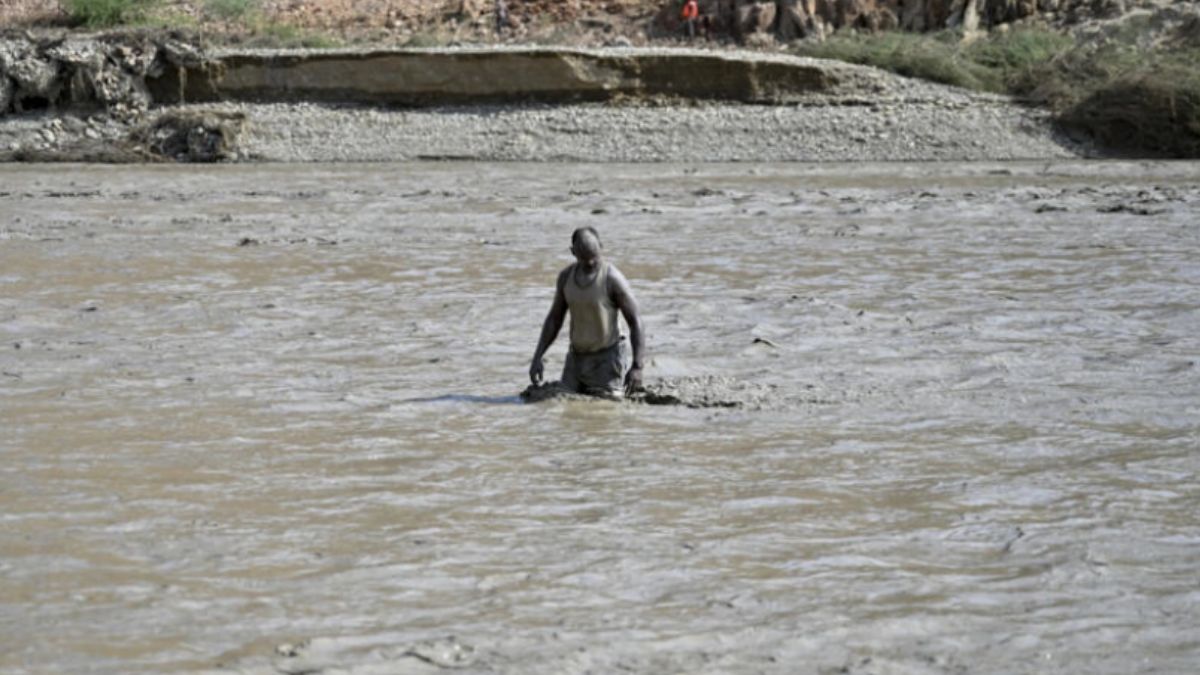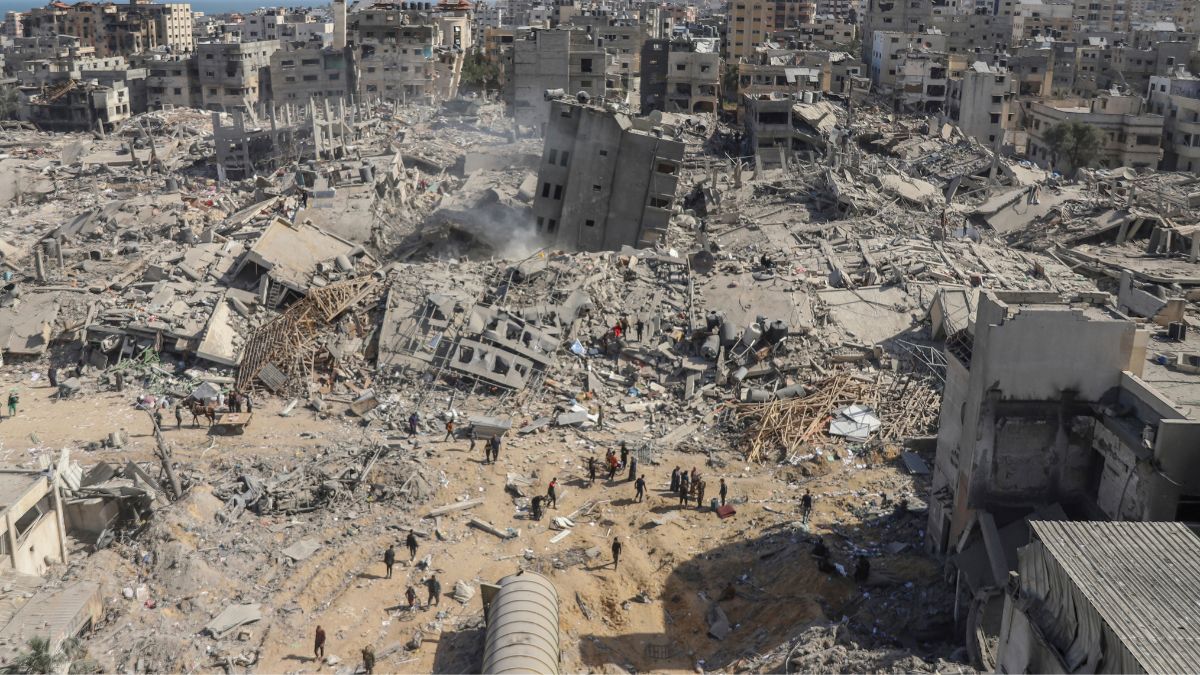In her first statement since her ouster from power, former Bangladesh prime minister Sheikh Hasina has urged the people to observe August 15 as ‘National Mourning Day’ to commemorate the anniversary of the assassination of her father, Sheikh Mujibur Rahman. The remark coincided with the interim government’s decision to scrap the holiday on this day. But what led the Muhammad Yunus government to take such a step? read more
)
People at the vandalised museum dedicated to Sheikh Mujibur Rahman, father of ousted Prime Minister Sheikh Hasina in Dhaka, Bangladesh. The interim government has scrapped the national holiday on August 15. AP
On August 5, Sheikh Hasina fled Bangladesh after resigning from the position of prime minister and sought solace in India. Nearly 10 days later, on Tuesday (August 13), the former Bangladesh prime minister broke her silence, through a statement released by her son, Sajeeb Wazed Joy, asking people to observe August 15 — the anniversary of the assassination of her father Sheikh Mujibur Rahman — as ‘National Mourning Day’.
Interestingly, her call came hours after the Muhammad Yunus-led interim government decided to cancel the national holiday on August 15. “The decision to cancel the national holiday on August 15 was taken unanimously after a discussion with the council of advisers and political parties,” said a press release sent from the Chief Adviser’s Office.
We take a closer look at the history behind declaring August 15 a national holiday and the possible reasons behind the Yunus government cancelling it.
Sheikh Hasina’s plea to Bangladesh
In her first statement since she fled the country after facing protests, Hasina in a lengthy statement said that rioters should be punished, saying those involved in recent “terror acts”, killings and vandalism must be investigated, identified and punished. Her statement coincides with Hasina being booked for murder.
She added in her statement that she wanted an investigation and demanded “punishment for those responsible for the killings and sabotage.”
In the same statement, she also urged the people of Bangladesh to commemorate August 15 as ‘national mourning day’ with due dignity and solemnity.
English translation of my mother's statement:
Dear Bangladesh,
As-salamu alaykum.
Brothers and sisters, on August 15, 1975, the Father of the Nation and the then President of Bangladesh, Bangabandhu Sheikh Mujibur Rahman, was brutally assassinated. I pay my deepest respects to…
“I sympathise with those like me who continue to live with the pain of losing near and dear ones. I demand a proper investigation to identify those involved in these killings and terror acts, and appropriate punishment for them… I appeal to you to observe the National Mourning Day on August 15 with due dignity and solemnity. Pray for the salvation of all souls by offering floral garlands and praying at Bangabandhu Bhaban,” she urged.
She further expressed grief over the burning down of the Bangabandhu Museum during the recent violence. She asserted that the “memory and inspiration, which we had to live, was burnt into ashes” and urged Bangladeshis to offer prayers and leave wreaths at the Bangabandhu Memorial Museum premises.
National Mourning Day in Bangladesh, explained
Each year, Bangladesh observes National Mourning Day on August 15 to remember and mourn the brutal assassination of the nation’s first president, Sheikh Mujibur Rahman, in 1975.
Also known as ‘Bangabandhu’ (friend of Bengal), Sheikh Mujibur Rahman was the founder of Bangladesh who led the independence movement for East Pakistan (Bangladesh) against West Pakistan.
It was on August 15 1975 that Rahman’s life was cut short when a group of Bangladesh Army personnel staged a coup and stormed his residence at Dhanmondi 32. At 5.30 am, when sentries at Bangabandhu’s house began to hoist the national flag, the attackers made their way into the residence and pumped 18 bullets into Rahman. In the massacre that ensued, Sheikh Fazilatunnesa, Rahman’s wife, his sons Sheikh Kamal, Sheikh Jamal, and Sheikh Russell, and daughters-in-law Sultana Kamal and Rosy Jamal were killed in cold blood.
It was only his two daughters, Sheikh Hasina and Sheikh Rehana, who escaped the assassination because they were in Germany.
The assassination of Rahman changed Bangladesh’s history forever, leaving scars that time can’t erase. It was only in 2010, 35 years after Sheikh Mujibur Rahman was killed that Bangladesh hanged five former army officers of the crime.
In 1996, August 15 was declared National Mourning Day by the Hasina-led Awami League party after it came to power in the country. It was again scrapped by the Bangladesh Nationalist Party and Jamaat-e-Islami coalition government in 2001. However, following a 2008 high court order, August 15 has been observed as National Mourning Day.
Each year since then, the day is marked as a public holiday and a black flag is hoisted along with the national flag being kept at half-mast. Other events are also held by Awami League leaders to honour the country’s architect.
And despite the anger and unrest, the Awami League leaders, who are still in the country, have made preparations for August 15, reported the Dhaka Tribune, seeking security assurances from the new interim government.
Scrapping of holiday on National Mourning Day
But why has the interim government scrapped the holiday on August 15? On Tuesday, the Yunus-led interim government approved the decision after holding a meeting with different political parties, excluding the Awami League. Some of them were in favour of keeping the day as a national holiday and some others were opposed to it, reported NDTV.
Many believe that the holiday has been cancelled, keeping public sentiment in mind; there’s a lot of anger directed at Sheikh Hasina, which could be seen when angry protesters stormed the Bangabandhu Memorial Museum, which is dedicated to Sheikh Mujibur Rahman, and looted it and then set it ablaze. Moreover, protesters also brought down Rahman’s statue situated in Dhaka.
The scenes of the statue being vandalised and the museum being looted shocked many, with India’s Biocon founder and chairperson Kiran Mazumdar-Shaw calling it a “sad day for Bangladesh”. In a post on X, she wrote, “Destroying the statue of the father of the nation? Do they even know their history? Sad day for Bangladesh.” She also shared a video along with her post that showed two people destroying the statue with hammers.
However, Deep Halder writes in The Print that the desecration of Rahman’s statue pointed to an Islamic Bangladesh displaying its distaste for statues of living beings, whether iconic or ordinary. “Many Bangladesh watchers interpreted these attacks on Mujib’s statues as an attempt by angry protesters to scratch out a part of their history they are no longer associated with or as an angry reaction to his daughter’s rule, which they had termed autocratic. What many missed is Islamic Bangladesh’s unease and troubled history with statues of any living beings, be it Bangabandhu or others.”
However, with Hasina now calling for her supporters to commemorate the day, despite the government’s order, there’s concern that it could lead to another crisis for the interim government.
With inputs from agencies

 2 months ago
12
2 months ago
12
)
)
)
)
)
)
)
)
)
)
)
)
)
)
)
)
)
)
)
)
)
)
)
)
)
 English (US) ·
English (US) ·